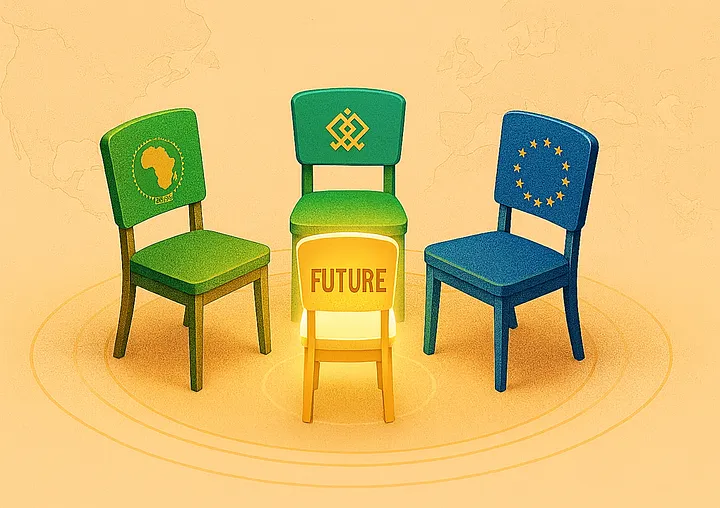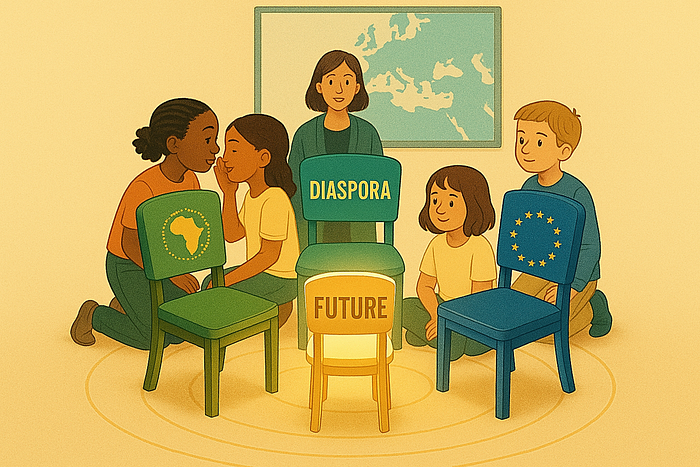
The Diaspora Has Taken Its Seat in Africa-Europe Futures.
An Insightful Piece by Jeff Kwarteng Jacobsen
By 2050, one in four people on Earth will be African. Europe, meanwhile, is ageing fast. This demographic reality is already reshaping the world and the Diaspora are at the centre of this transformation. They are a generation raised between continents and fluent in multiple systems.
This foresight narrative explores what happens when we move from symbolism to practice by 2050. It introduces the Four Chairs approach and asks what happens when it becomes a way of thinking. Imagine a room where Four Chairs – Africa, Europe, the Diaspora and the Future – form a circle, not a hierarchy and no sidelines. The Future sits in the centre, not as a guest but as a participant. It is a way of seeing the Diaspora and the Future as deeply connected because as the Diaspora grows, so does its leadership to shape Africa-Europe futures.
Why Now | Demographics, Belonging and the Urgency of Design
Two converging realities demand new thinking.
First, the demographic asymmetry between Africa and Europe is already impacting labour markets, migration policies and civic discourse.
Second, the legal architecture of belonging is evolving in Europe and Africa. For example, in Germany, the 2024 Act to Modernise Nationality Lawopens the door to dual citizenship. In Ghana, the Representation of the People (Amendment) Act, 2006 (ROPAA) promises voting rights for citizen abroad though its implementation remains incomplete.
The Four Chairs approach sits at the intersection of these systematic shifts. It recognizes the Diaspora as system translators that are fluent in both continents. Our task is to institutionalise that fluency, not only symbolically celebrate it.
Voices from 2050 | The Diaspora Generation Speaks
We write from 2050 as first and second generation raised with two continents in our hands. Some of us hold two passports, many only one. But all of us hold stories and lived realities belonging to both continents.
We are the Ghanaian‑German children of dual citizenship, the Senegalese‑French students of two parliaments, the Nigerian‑Dutch poets of two tongues.
We are able to do our German taxes and send remittance. We are able to interpret EU directive and Akan proverbs. We are fluent in both systems.
By 2050, “Diaspora” is no longer a legacy of migration. It is a title of responsibility. We are a foundation learned to stand on its own pillars.
“Diaspora is no longer a bridge. It is a foundation.”
The Geometry of Power | Four Chairs and a Shared Future
Africa-Europe relations are not linear. They are circular. Three chairs – Africa, Europe and the Diaspora – sit in a dialogue. At the centre sits the Future. Always visible, always present.
We come together in rooms where many languages speak at once. Twi alongside German, Wolof mixes French, Portuguese with Kikongo. Outside, the air of Accra or Berlin tastes of doner kebab or fresh sugar bread, depending on where we are meeting.
In 2050, the Four Chairs shapes how we govern, how we imagine and how we belong.
Layered Citizenship | Designing Belonging Across Borders
The reforms that we have seen in Germany and Ghana enabled this future and were examples of the first cracks in the old walls of belonging.
With them, we could vote in Accra while teaching in Munich. We help make decisions in our local communities in Berlin while investing and building businesses in Tamale. Identity stopped being a zero-sum game.
Layered citizenship has become the new normal and is designed across borders. The Diaspora did not wait for approval. We shaped the futures from scratch by implementing ideas until policies caught up.
Innovation in Action | Diaspora as Catalyst
We remember the floods of 2041, when cities along the Gulf of Guinea nearly drowned. A young Diaspora engineer named Ama, raised in Hamburg and Kumasi, led a team that designed adaptive coastal corridors combining ancestral knowledge and satellite data.
We remember the migration surge of 2043, when conflict forced millions to move. The Diaspora reframed the moment not as crisis but as circulation. Skills flowed instead of drained and networks formed instead of fractured.
These responses did not come out of nowhere. They were rehearsed in Diaspora assemblies, imagined in foresight labs and shaped by multi-system fluency.
“No single voice can carry the future alone.”
From Deficit to Authorship | Rewriting Africa-Europe Futures
Africa’s story is no longer told in deficit. It is told in authorship.
We are no longer framed as exporters of labour or receivers of aid. We are co‑creators of new ways to live, work and build economies.
By 2050, the old idea of the “third place” has been replaced by the reality of the third voice – the Diaspora voice.
In foresight labs and community gatherings, this voice leaves behind artifacts of transformation:
- A 2040 ballot listing candidates across time zones, open to citizens abroad.
- A certificate of apprenticeship that works from from Kumasi to Cologne.
- An acoustic sensor from a wind corridor project, engraved with fishing proverbs to remind engineers that the sea is an elder.
“The Future is not a guest. It is a citizen.”
The Civic Ritual | Teaching the Future to Sit Among Us
Children have absorbed this naturally. In schools from Accra to Amsterdam, they draw four chairs. Africa, Europe, Diaspora and Future.
One child, Ayo, places a book on the Future chair during a debate. She whispers a question to it, then smiles. The class nods. The chair is not symbolic, it is a participant.
This ritual teaches more than imagination. It teaches how to shape society. They learn that the Future is not far away and already here, sitting with us. They learn to ask it questions, to make space for it and to lead with it.
This instinct has become architecture. Assemblies, communities, labs and classrooms are acknowledging and embracing all Four Chairs.

The Future Has Taken Its Seat
We, the Diaspora, are not bridges anymore. Bridges are passed over.
In this world, Africa’s futures are not decided for us but shaped with us. They are not promised but practiced. And the practice, the act of keeping a seat for the Diaspora and for tomorrow, is what makes those futures real.
The Four Chairs are a part of how we think, how we gather and how we move forward now. It’s become second nature, our way of shaping how Africa and Europe move together for a better future. By 2050, the Diaspora and Future do not wait outside. They already have a seat at the table alongside Africa and Europe.
Author’s Note:
Growing up between Germany and Ghana taught me what layered belonging feels like. Today, as a strategic advisor and foresight practitioner, I see the Diaspora not as a bridge but as a central pillar in Africa-Europe relations. This essay is part of my ongoing effort to position the diaspora where it belongs – at the centre of the conversation.
Let’s continue the dialogue – connect with me on LinkedIn
Source (Republished): Jeff Kwarteng Jacobsen on Medium
Images: Jeff Kwarteng Jacobsen on Medium

Jeff Kwarteng Jacobsen
Jeff Kwarteng Jacobsen is a Strategy advisor, AGYLE awardee, co-founder of Boldly e.V. and founding member of AiDiA. His writings explore how foresight and the diaspora shape economies and futures.
